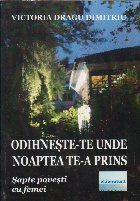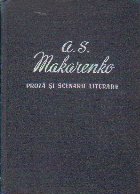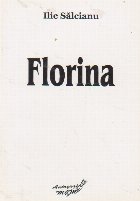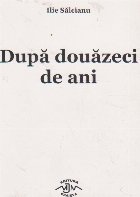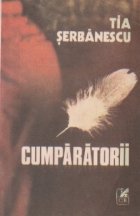Before the 1989 Revolution, a child (Ionut, a pupil at that time) is sent by his parents to buy "tacâmuri" (Chicken scraps ). In order to do this, he must wait in a fabulous, huge queue that surrounds many times the small town where he lives. To achieve his goal he waits in the queue for twelve months, in shifts with his father and meets the ones who will be his neighbours, friends, mentors, life models even. He witnesses the debates of the adults surrounding him learning about life and happiness, about how you get light when there is a power cut and how you chase the mosquitoes out of the house, and many other different things that a twelve-year old filters in his mind and consequently tells a fantastic story.
In parallel with the queue's life, the child's voice describes life in those times seen through his eyes. He tells us about the cold in our houses, about the lack of electrical power-when children studied by candle light, about life in school, agricultural work in the fields which involved pupils, pioneers' songs and lyrics, Ceausescu work visits, aerated water bottles, Police, Pepsi, 23rd August marching, abortion, the honour bench in the classroom, etc.
Finally, he succeeds in buying that chicken stuff.
At the end of the book the storyteller confesses that he became a policeman, the fulfilment of one of his childhood's dreams when he had realised that policemen had people's respect and they never queued.
It is a very sad story in a book full of humour.
"A novel whose magical power makes you burst into laughter or into tears and leaves you dazed on the verge of the two moods," says Madalina Ghiu, editor-in-chief at Cartea Romaneasca in her presentation of the book.
The Queue is a book meant to make us remember, a book which feels the pulse of fragile realities, almost at the edge of the fabulous but also of the rational - the Queue as a supreme reality, sole reason and opportunity to communicate with others and for some of the characters, even the unique goal in life, that represents more than observing bits of life during communist times.
As the author himself states, the book addresses a large public, from those who lived before the Revolution to those who have been born after that, from former children with keys hanging from their necks to their parents and grandparents, from those who know and want to remember to those who don't know but want to find out.
The Queue follows two trends which have proven highly successful in today's Romanian literature: first person narrative and an unconventional view on childhood.
The Queue is the theme of the novel, the leit-motive which directs all the epic threads of the book, the way of living of a hungry community, every citizen's dream and the centre of a world which lives only to get some "tacâmuri" (Chicken scraps) from the Alimentara (Grocery store) . This is a world which serenely and naturally acknowledges its abnormalities, missing the awareness that in fact it's living in a war régime. When food is brought to Redresarea (name of the grocery store), a real exodus of population takes place towards the place. The fact that something at all eatable was sold there becomes the central event of the neighbourhood and of all known places in town. It is interesting to find out that bananas, chocolate, olives and oranges are considered miraculous products which bring happiness to those lucky enough to get them. Here is a child's dream: "In my dream, there was a field and on that field, instead of butterflies flying around, there were bananas flying in all directions, big and fat as the Turkish pumpkins which I would catch with a net and I would devour on the spot. In our yard, there were more bananas growing in the apple trees, pear trees, plum trees and apricot trees and the loaves stacks had turned into banana peels stacks. In the vegetable garden, where I knew that my grandma had planted carrots, beautiful bananas had grown with carrot leaves springing out of the stock. A dizzying smell would envelop me from all around. I thought I would turn into a banana myself. When I woke up in the morning, I felt the unmistakable taste of the most delicious fruit on earth. One night, I dreamt that father had filled my bedroom with bananas and when I opened the door, the bananas collapsed on top of me and covered me up. I sat on the drawer by myself for hours, eating bananas and carefully folding the peels, because I wanted to show them to my colleagues who would not have believed, not for the world, that I had had a room full of them."
The narrative perspective is a very coherent one and the look the child casts upon the world is full of curiosity. The epical discourse exhales candidness, with everything happening out in the open. The seeming gullibility of the narrator-character, a twelve-year old named Ionut, places communist society in a cruel, comical, grim light. The ridiculous takes on fabulous dimensions, this being one of the great assets of the book. Having as background the buildings under construction, the children are proud of their key chains, their apartment keys and the ribbons to which they were attached: "There was this boy, Manase, in the neighbour building who had a string made of leather and it was the smartest one. The lucky bastard had also a clean, yellow key, square-headed and with new notches. I had this wretched ribbon which got dirty all the time and a distorted key, round-headed and worn-out. In order not to be open to ridicule, I used to wear it under my T-shirt. Manase used to take it out no matter what he was wearing. But I outrivaled him once I managed to get my hands on a keychain."
The children's favourite playground is the construction site. It is from this place that they can get all the things they need: wires, cables, screw nuts, bolts, electrodes, plywood and calcium carbide from which they make banging guns. Many of them even stealthily eat the workers' food. At the bread booth, there is Aunt Zina a curled hair lady, with long, red-painted nails and always wearing lipstick. We liked her because she had big boobies, waggling like a jelly". The narrator-character cannot take his eyes away from the burly woman's ornaments. He and his playmate, Popa, who procures some binoculars, spy on Aunt Zina all day long. They get caught by her husband who seizes the binoculars. They avenge themselves by telling Zina on the phone that Doru, her husband, was looking" at Geta, the bimbo" who had recently moved into their building.
Dragos Voicu uses in his book the technique of oversizing the objects, a refined hyperbole which implies that the world he revives is ruled by bizarre laws not familiar to the civilized world. He reviews things like bicycles, plastic bags, the stools people sit on while queuing, the hats they wear, and all the other elements that are of importance in people's life. And the idea of imagining a fabulous queue which girdles the town several times and which lasts for twelve months is an exceptional one. The seasons follow one another, people celebrate their birthdays, fall in love, get married or even die. They dispute about everything that embodies their grey existence. In fact they are deeply miserable. But they are not really aware of this because they do not have the time to meditate upon their condition and they do not know any other way of living. Ionut, the pupil, is a watchful portrayer: Uncle Marin, Uncle Costel, Aunt Nuti or Mr Georgescu, the teacher who writes stories, are very skilfully presented. People living in the blocks of flats feast every Sunday: people woke up early in the morning and put the loudspeakers on the window sill. One could hear tens of songs at the same time in the neighbourhood. I couldn't quite do my homework. Then, the men took out their grills at the corner of the building and they kindled the fire with petrol from Bratan, the PECO storekeeper (the only gas filling station in Communist times in Romania). While waiting for the embers to be right, they played backgammon beside the fire. Everybody seemed happy in that particular moment. The entire neighbourhood was enveloped by the grills' smoke and by the music coming out the windows. And the children came down to join their fathers and tasted the roast. Back then, there was a film on TV, called Tarzan. We would scream out loud just like he would:" Oooooooooooooo ......oooooooooooo!" [...] Towards the evening, people came out and sit on the benches and those who would not catch a seat, would sit on the building's stairs, chattering and eating sunflower seed. They left tones of seed peels behind them! We, the children, would fill our fists with them and pour them on our heads!"
Life goes on and the events of the town run along with the events happening at the queue. The school is about to start and the pupil must have his hair cut, a good occasion to bring into discussion the special status of the barbers who drink...Pepsi. Or, another chance for everybody to prove their importance is the aerated water bottles parade.
"Well, everybody was meeting everybody when going to fill their aerated water bottles and it was not the same thing having a 7 litter stainless bottle, and another thing to have a 2 litter glass one. He who had a 7 litter one was the coolest."
Literary critic and writer Serban Tomsa considers that The Queue is an admirable debut, a "charming book", cheerfully written, which one reads all in a breath. He notices how the author systematically recalls the pioneers' obligations at school, the pioneer's oath, the patriotic songs, the report presenting solemnity and so on. He does not leave aside the "work in the fields" period either. One could get the "redeeming" absolution from it if they offered a pack of Kent cigarettes or a good soap to the right person. Pupils pick tomatoes, beans, grapes.
A very funny situation is the one where the boy's grandfather comes across a dead hare. The old man is investigated for this by the Police who give him a fine. The man's wife feasts the policemen with wine and a roast chicken, and when they leave she gives them a bag of maize flour and two red pepper strings, saying "that's the way of the world". The lecture one of the policemen gives the peasant is worth a million: "Listen here, old man, in all my career as a policeman I've never seen a hare that died of old age. They don't die unless they're snared, or hunted, for your information. And even if it died of old age, was this hare so daft as to die in a ditch so you could find it? "
Serban Tomsa also comments on how the childhood eroticism is presented in the book "bluntly but also without auxiliary details": "[...] she was the first one in the class to have sex with Bruno, from the 7th grade, on the teachers' desk, after classes."
The narrator's interest is even more bestirred by growing of the silkworms and by the artistic" contests. He keeps reminding us of the others pioneers' responsibilities: collecting scrap paper and empty glass bottles. The queue is from this perspective, a true monograph of the pupil who has studied in the society we used to have. At the same time, the queue continues to grow. "The town was swathed, almost suffocated by the queue for chicken scraps".
After school starts, the boy's life takes on a hellish rhythm: "So I began the work in the field. I'd leave home at 8 in the morning and I'd come back at 5 in the afternoon. I'd come home to get what I had collected from the field, I'd have something to eat and then I'd go to sit in the queue. Father would come to change places with me at 8 in the evening. He would sit in the queue all night long and then, when morning came, he would leave for work. During the night, he would doze on his stool just, the same as everybody else." .After the child finishes his private tutoring classes, he slides his teacher the money into the elastic band of her skirt, as I had seen my father do with a nurse at the hospital."
His birthday is celebrated in the queue. The butter his mother uses to make the cake becomes an issue to debate because it came from Aunt Rodica, our neighbour who worked in the milk factory" and the family dangerously gets to the point of becoming the subject of public disdain because they had got goods through secret relationships. In order for the party to be successful, his father gets in some fiddlers and they kindle the fire for the grill, of course. Everybody in the queue runs home to grab something to put on the grill...
Winter comes, Uncle Marin's sweat is not that strong any longer, but their flats are extremely cold. Ionut's family gets warm with an electric stove, then with a gas stove. The vestibule is isolated from the rest of the apartment by thick blankets. The description is so real, that you feel the cold while reading it. People celebrate Christmas, the New Year, Easter and August 23rd in the queue. At Christmas, they even receive the carol singers while queuing. They talk about electricity, candles, car batteries, mosquitoes, ultrasounds, power generators and happiness. A warrant officer explains people why they must not spend anything more that the state allows them to. The only one who is doing decently, doesn't queue, always has the refrigerator full and can procure anything is Arnautu, the police officer. Finally, Mr Georgescu, the Maths teacher marries Miss Calomfirescu and Uncle Costel dies. In his funeral speech, Uncle Marin does not foerget to remind people that Uncle Costel had been a real patriot...
The novel's ending is a very good one. Here is the moment when the chicken scraps are finally being given to people: Further in front of me, there was the magical eyelet through which the chicken scraps were coming out. It was in fact a small cut-out hole in an iron door, the size of an A4 sheet. Tens of hands, fermenting around that hole, clenching the money in their fists, were chaotically flustering as if their owners were about to drown themselves. There were all kinds of frantic hands: delicate hands, with long, bony fingers, I thought they belonged to teachers, harsh hands with sausage-like fingers, small women fists and big, rough fists like Uncle Marin's. The long, thin hands were the most calm. They held the money aimed at the sky, as if they had looked for a breath of air. The harsh, sausage-fingered ones, were the most nervous."
To come out successful in such a queue is an act of bravery. The father, just like a hero who has won a difficult battle, takes the boy to the pastry shop to celebrate the victory, that is buying the chicken scraps, and at home, the parents' bed squeaks all night, till morning.
Although this is just his debut, Dragos Voicu proves the ability to structure a novel, because, in the last chapter, he knows how to cast a dark light upon this seemingly happy world: I've become a policeman just like Mr Arnautu. I've lost contact with my queue neighbours. It was just once that I came across some information about them. Two years ago, we had to move the archives that belonged to the former Securitate (Secret Service before 1989) . Among the thousands of pages, I also found a very long series of files called The Queue". I read there short episodes written by Uncle Marin, Uncle Costel, Aunt Florica, Aunt Nuti and by teacher Georgescu. Each of them had written something about the others. There was also a file with my father's name on it. I did not open it. I am sure that it was just empty covers."
Serban Tomsa considers The Queue to be the debut novel of a real narrator whose evolution he's awaiting with great interest".

